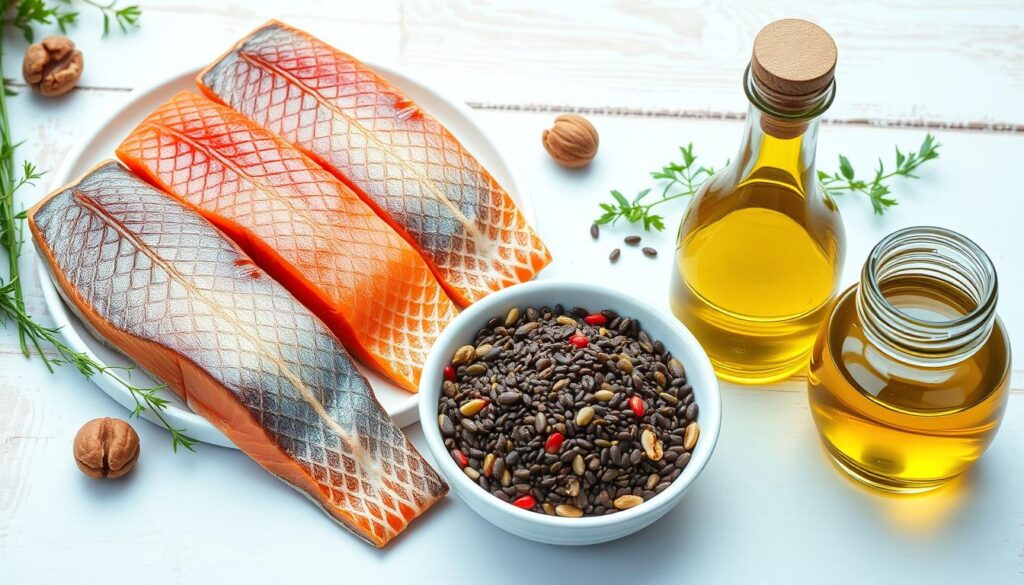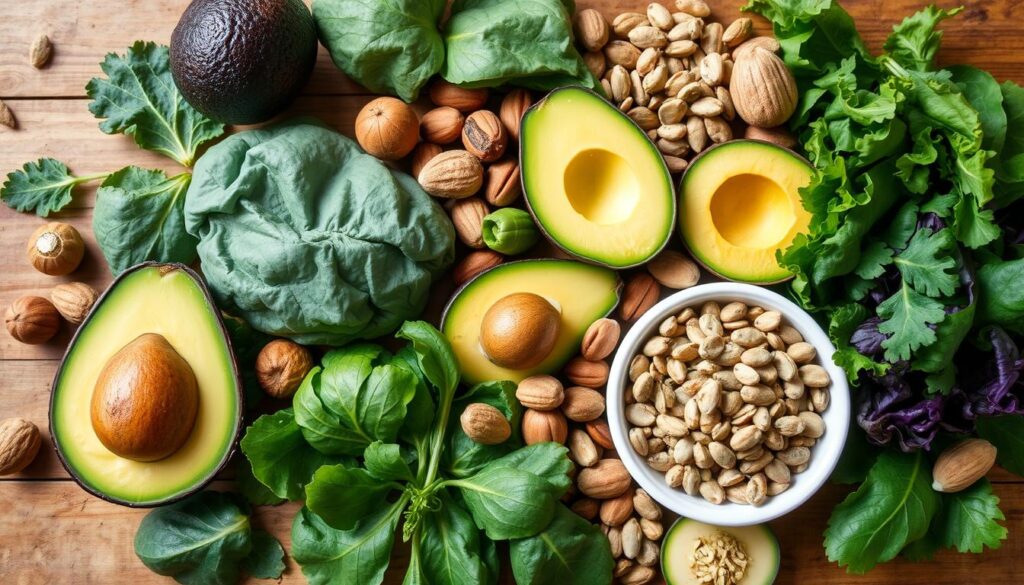Did you know clogged arteries affect over 92,000 Australians each year? This leads to 43,000 heart disease-related deaths annually. It’s crucial to know how to naturally clear arteries and support heart health. This guide will show you the best natural foods to unclog arteries, lower cholesterol, and boost heart wellness.
Key Takeaways
- Discover natural foods that can effectively unclog arteries and reduce the risk of heart disease
- Learn about the impact of diet on arterial health and the signs of clogged arteries
- Explore the heart-healthy components of the Mediterranean diet and its benefits for cardiovascular wellness
- Understand the power of omega-3 rich foods, antioxidants, and fibre-rich foods in combating cholesterol
- Discover the role of natural plant sterols, herbs, and spices in supporting arterial health
Understanding Arterial Health and Cardiovascular Wellness
Keeping our arteries healthy is key for good heart health. Arteries carry oxygen-rich blood around our body. If they get clogged, it can cause serious health issues.
How Arteries Become Clogged
Arteries can get clogged with plaque, made of cholesterol, fat, and more. This buildup narrows and stiffens the arteries. Eating a low cholesterol diet helps prevent this and keeps arteries healthy.
The Impact of Diet on Arterial Health
What we eat affects our artery health a lot. Eating foods rich in heart-healthy fats, like olive oil, avocados, and nuts, can help. But, a diet full of saturated and trans fats can harm our arteries.
Signs of Clogged Arteries
- Chest pain or discomfort (angina)
- Shortness of breath
- Fatigue
- Numbness or weakness in the legs
- Difficulty walking or climbing stairs
If you notice these symptoms, talk to your doctor. They can find out why and help you.
Food That Unclog Arteries Naturally: Essential Guide
Keeping your heart healthy is key to feeling good. Luckily, there are foods that can help keep your arteries clear. These natural cholesterol-lowering foods fight inflammation, boost blood flow, and cut down bad cholesterol.
Garlic is a top choice for keeping arteries open. It has allicin, which stops plaque from building up. Eating garlic regularly can make your arteries work better and lower heart disease risk.
Oily fish like salmon, mackerel, and sardines are also great. They’re full of omega-3 fatty acids, which fight inflammation and lower triglycerides. This helps prevent blockages in your arteries.
| Food | Mechanism of Action |
|---|---|
| Garlic | Reduces inflammation, prevents plaque buildup |
| Oily Fish | Provides anti-inflammatory omega-3 fatty acids |
| Berries | Rich in antioxidants, improve blood vessel function |
| Nuts and Seeds | Contain healthy fats and fibre, lower cholesterol |
Berries and nuts and seeds are also good for your heart. Berries are full of antioxidants, and nuts and seeds have healthy fats and fibre. These foods help lower cholesterol.
“Incorporating these artery-unclogging foods into your daily diet can make a significant difference in your cardiovascular health.”
Choosing the right foods can help keep your heart healthy. By adding these food that unclog arteries naturally to your diet, you’re taking care of your heart. A balanced diet is essential for keeping your arteries in top shape.
Heart-Healthy Mediterranean Diet Components
The Mediterranean diet is known for its heart health benefits. It nourishes the body and supports heart wellness. This diet uses special ingredients.
Benefits of Olive Oil and Fish
Olive oil is key in the Mediterranean diet. It’s full of good fats and antioxidants. These help lower cholesterol and reduce heart disease risk.
Fatty fish like salmon and mackerel are also important. They’re packed with omega-3s that boost heart health.
Mediterranean Herbs and Spices
The diet also includes many herbs and spices. Rosemary, thyme, oregano, and garlic add flavor and fight inflammation. They help keep the heart healthy.
Daily Meal Planning Tips
Adding Mediterranean diet principles to your day is easy and tasty. Begin with a breakfast of whole grains, fruits, and olive oil.
Lunch and dinner should include veggies, lean proteins, and healthy fats. Don’t forget a glass of red wine. This makes for a heart-healthy meal plan.
Power of Omega-3 Rich Foods for Arterial Health
Keeping your heart healthy is key to feeling good. Omega-3 fatty acids in your food can help a lot. They are found in some foods and help your arteries stay healthy.
Omega-3s are great for your heart. They lower bad fats, reduce swelling, and help blood vessels work better. Eating foods rich in omega-3s can help keep your heart healthy.
Omega-3 Rich Foods to Incorporate
- Fatty fish, such as salmon, mackerel, sardines, and tuna, are excellent sources of omega-3 fatty acids.
- Plant-based options, including walnuts, flaxseeds, chia seeds, and canola oil, also provide beneficial omega-3s.
- Certain fortified foods, like eggs and dairy products, can also contribute to your omega-3 intake.
Eating these foods regularly can greatly improve your artery health. Omega-3s help lower bad cholesterol and fight inflammation. This keeps your blood vessels flexible and reduces heart disease risk.
“Omega-3 fatty acids are a true powerhouse when it comes to supporting a healthy heart and unclogging arteries. By making simple dietary choices, you can harness the benefits of these essential nutrients and take a proactive step towards improved cardiovascular wellness.”
| Omega-3 Rich Food | Cholesterol Lowering Properties |
|---|---|
| Salmon | High in EPA and DHA, which can help lower triglycerides and LDL (bad) cholesterol levels. |
| Flaxseeds | Rich in alpha-linolenic acid (ALA), which may help reduce LDL cholesterol and increase HDL (good) cholesterol. |
| Walnuts | Contain ALA and other compounds that can improve cholesterol ratios and reduce inflammation. |

Choosing foods rich in omega-3s is a big step towards a healthy heart. These foods naturally lower bad cholesterol and support your heart’s health.
Antioxidant-Rich Foods for Cardiovascular Protection
Antioxidant-rich foods are key to keeping your heart healthy. They fight off harmful free radicals, reduce inflammation, and protect blood vessel linings. Berries and dark chocolates are especially good for this.
Berries and Dark Chocolates
Berries like blueberries, raspberries, and blackberries are full of anthocyanins. These antioxidants boost blood flow and prevent artery clogs. Dark chocolate, with its flavanols, also helps lower blood pressure and improve blood vessel function.
Leafy Greens and Colourful Vegetables
Leafy greens like kale, spinach, and Swiss chard are packed with nitrates. These nitrates widen blood vessels and improve blood flow. Adding colourful veggies like bell peppers, carrots, and tomatoes to your diet gives you a variety of antioxidants for heart health.
Timing and Portions Guide
- Try to eat antioxidant-rich berries every day. You can have them as a snack, in smoothies, or on yogurt.
- Enjoy a small piece of dark chocolate (at least 70% cacao) as a treat. Stick to 1-2 ounces per serving.
- Make sure half your plate is filled with leafy greens and colourful veggies at each meal. This boosts your antioxidant intake.
| Antioxidant-Rich Food | Key Benefits | Recommended Serving |
|---|---|---|
| Berries | Improved blood flow, reduced plaque buildup | 1 cup per day |
| Dark Chocolate | Lower blood pressure, better vascular function | 1-2 ounces per serving |
| Leafy Greens | Dilated blood vessels, enhanced circulation | 1-2 cups per meal |
| Colourful Vegetables | Wide range of antioxidant protection | 1-2 cups per meal |
Eating these foods, green leafy vegetables, and berries daily can help keep your heart healthy. It’s a natural way to fight artery clogs.
Essential Nuts and Seeds for Heart Health
Nuts and seeds are key for a healthy heart. They’re full of good fats, fibre, and nutrients. These help keep arteries clear and support a diet low in cholesterol.
Almonds are great because they have monounsaturated fats. These fats can lower bad cholesterol. Walnuts, on the other hand, are rich in omega-3s. These fats are good for reducing inflammation and improving blood flow.
- Almonds: High in monounsaturated fats, fibre, and antioxidants, almonds can help lower LDL cholesterol and reduce the risk of heart disease.
- Walnuts: Packed with omega-3 fatty acids, walnuts can help improve blood vessel function and reduce inflammation, which are crucial for maintaining a healthy heart.
- Chia seeds: These tiny powerhouses are loaded with soluble fibre, which can help bind to cholesterol and facilitate its elimination from the body.
- Flaxseeds: Rich in omega-3s and lignans, flaxseeds have been shown to help lower LDL cholesterol and blood pressure levels.
To add these heart-healthy foods to your diet, try them on your porridge, in salads, or as a snack. Including them regularly can help unclog your arteries and boost your heart health.
Fibre-Rich Foods That Combat Cholesterol
Eating foods high in fibre is a natural way to keep cholesterol levels in check. Whole grains and legumes are especially good for your heart. They offer many benefits for your heart health.
Whole Grains and Legumes
Whole grains like oats, brown rice, and quinoa are full of soluble fibre. This type of fibre helps lower the bad cholesterol. Legumes, such as beans, lentils, and chickpeas, also have soluble fibre and plant-based proteins. These can help keep cholesterol levels low.
Eating these fibre-rich foods every day can greatly improve your heart health. A study in the Journal of Nutrition and Metabolism showed a 23% lower risk of heart disease with a diet rich in whole grains and legumes.
Daily Fibre Requirements
Australian adults should aim for a certain amount of fibre each day. Women need:
- 25-30 grams of total dietary fibre
Men need:
- 30-38 grams of total dietary fibre
By choosing fibre-rich foods like whole grains, legumes, fruits, and vegetables, you can fight high cholesterol. This supports the health of your arteries.
Natural Plant Sterols and Their Benefits
Looking to lower your cholesterol naturally? Plant sterols are a game-changer. These compounds, also known as phytosterols, are found in plant-based foods. They have a similar structure to cholesterol.
Plant sterols can inhibit the absorption of cholesterol in our bodies. This helps lower harmful LDL cholesterol levels. They work by competing with cholesterol for absorption in the intestines. This keeps cholesterol levels in check and reduces the risk of heart disease.
Foods Rich in Plant Sterols
- Nuts and seeds, such as almonds, pistachios, and sunflower seeds
- Vegetable oils, including canola, olive, and avocado oil
- Whole grains, such as oats, barley, and brown rice
- Legumes, including soybeans, lentils, and chickpeas
- Fruits and vegetables, particularly avocados, broccoli, and Brussels sprouts
Eating foods rich in plant sterols can help keep your arteries healthy. It also lowers the risk of heart disease.
“Plant sterols are a natural, safe, and effective way to help lower cholesterol levels and support cardiovascular health.”

Discovering the benefits of plant sterols can lead to a healthier heart. Simple changes in your diet can make a big difference. Adding these compounds to your lifestyle supports your heart health naturally.
Herbs and Spices That Support Arterial Health
Keeping your heart healthy isn’t just about eating the right fruits and veggies. Herbs and spices also play a big role. They help keep your arteries healthy and support your heart. Let’s look at how these plant-based foods have been used for ages and the science behind them.
Traditional Medicine Perspective
In ancient healing systems like Ayurveda and traditional Chinese medicine, herbs and spices were key. Turmeric was valued for its anti-inflammatory and antioxidant powers. It helps prevent artery blockages. Ginger was also highly regarded for boosting blood flow and keeping cholesterol levels in check.
Modern Scientific Evidence
Today, science supports the traditional uses of these herbs and spices. Garlic has been shown to lower blood pressure and improve artery health. Cinnamon is known to help lower cholesterol, making it great for heart health.
Other herbs like rosemary, fenugreek, and black pepper also benefit heart health. Adding them to your meals is a tasty way to support your heart.
While these natural remedies are helpful, always talk to a doctor before changing your diet or adding supplements. This is especially true if you have health issues.
Conclusion
Incorporating natural foods that unclog arteries is key for a healthy heart. A Mediterranean diet is a great choice. It includes olive oil, fish, berries, and whole grains.
Omega-3 fatty acids, plant sterols, and certain herbs and spices are very powerful. They help improve blood flow and lower cholesterol. This prevents plaque buildup in arteries.
Choosing a diet rich in these foods is a smart move. It helps Australians keep their hearts healthy. This way, they can enjoy good heart health for many years.





